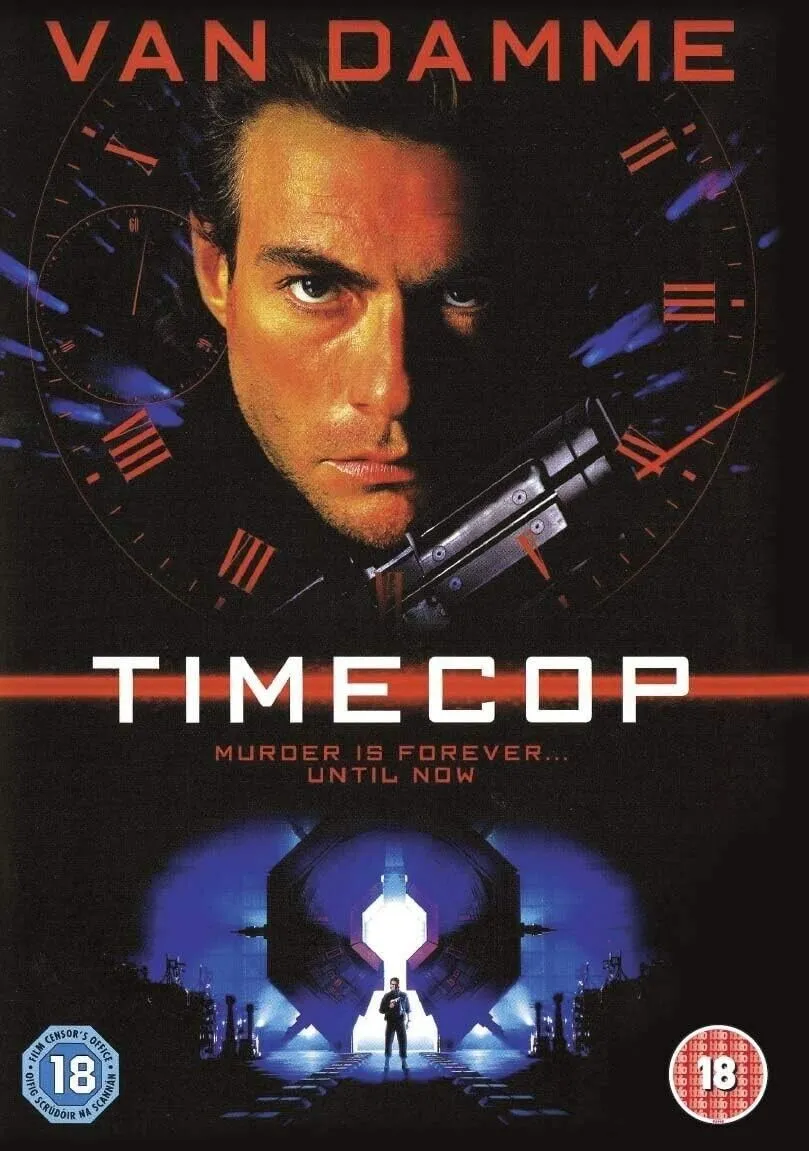Timecop (1994)
Timecop (1994) is a thrilling science fiction action film directed by Peter Hyams, starring Jean-Claude Van Damme in one of his most memorable roles. The movie revolves around the concept of time travel, blending high-stakes action with a complex narrative about personal loss, corruption, and the ethical implications of manipulating time. Set in the near future, the film introduces a world where time travel is not only possible but also highly regulated by a special government agency known as the Time Enforcement Commission (TEC). Van Damme plays Max Walker, a time-traveling cop working for the TEC, tasked with preventing criminals from exploiting time travel to alter the past for personal gain. The story follows Walker’s pursuit of a corrupt politician who is using time travel to manipulate history for his benefit, leading to a personal and dangerous battle that challenges both the timeline and Walker’s emotional journey. The film opens by introducing Max Walker as a dedicated cop working for the TEC. This organization ensures that time travel, though a reality, is carefully monitored and used only for legitimate purposes. Criminals have discovered ways to manipulate time to benefit from past events, such as influencing stock market crashes or fixing historical events for personal wealth. Time travel, however, comes with strict rules and regulations—people can only travel to specific points in time, and any interference with the past can have catastrophic consequences. Walker’s personal connection to time travel becomes clear when it is revealed that his wife, Melissa, was murdered years ago, a tragic event that haunts him. His motivation for working in the TEC is partly driven by his desire to stop criminals from altering history, but also by his own unresolved pain over his wife’s death.

As the film progresses, Walker is drawn into a web of conspiracy when he discovers that a powerful and corrupt politician, Senator Victor Ducard, played by Ron Silver, is using time travel for his own selfish gain. Ducard has been manipulating time to ensure his rise to power, making small but significant changes to the past to secure political victories and increase his wealth. In particular, Ducard is responsible for orchestrating the murder of Walker’s wife. The film's main conflict revolves around Walker’s pursuit of Ducard, as the senator continues to manipulate history, using time travel to cover up his crimes and evade justice. Walker, driven by his need for vengeance and his sense of duty, is forced to confront the man who ruined his life while also navigating the dangerous consequences of altering the timeline. Throughout the film, Timecop presents thrilling action sequences, with Van Damme’s signature martial arts and combat skills on full display. As Walker tracks Ducard through various points in time, he engages in intense fights, evades traps, and outwits the senator’s efforts to stop him. The action scenes are fast-paced and dynamic, with Walker using futuristic gadgets and time travel itself to his advantage. However, the film is not just about action—it also delves into the emotional complexity of Walker’s character. His personal loss and the desire for revenge complicate his mission, and he must balance his quest for justice with the understanding that altering the past could have unforeseen consequences. The climax of the film builds to a tense and action-packed final showdown between Walker and Ducard. The senator, who has been manipulating time to secure his political career, comes face to face with Walker in a final battle that tests both men’s resolve. As the confrontation unfolds, the rules of time travel become critical, with both characters using time itself as a tool to gain the upper hand. In a thrilling sequence, Walker manages to outsmart Ducard by manipulating the timeline, ensuring that Ducard’s actions are undone and preventing further harm to the future. The stakes are high, with the fate of history hanging in the balance, and Walker’s personal redemption tied to his success in stopping the senator’s manipulation of time.

In the end, Walker succeeds in thwarting Ducard’s plans, restoring the timeline and preventing any more damage to history. The movie closes on an emotional note as Walker comes to terms with the loss of his wife. While time travel offers him the opportunity to seek justice and revenge, Walker learns that some things, such as the death of his wife, cannot be undone. The resolution is bittersweet, as Walker finds peace in knowing that, despite the power of time travel, the past cannot be changed and that moving forward is the only way to truly heal. The final moments show Walker finding closure and accepting that while the past may never be fixed, the future is still within his control. Timecop is a unique blend of science fiction, action, and emotional drama. The film’s exploration of time travel and its consequences is both intellectually engaging and thrilling. Van Damme’s performance as Max Walker is compelling, as he balances the role of a tough, skilled cop with the vulnerability of a man grieving his wife’s death. The film also touches on the broader themes of corruption, the abuse of power, and the ethical questions surrounding time travel. The action sequences are intense, and the concept of time travel provides a fresh twist on the typical action movie formula. The film’s pacing is well-maintained, keeping the audience on the edge of their seats as the plot unfolds and the stakes rise. In conclusion, Timecop remains one of Jean-Claude Van Damme’s standout films, offering a memorable mix of action, sci-fi, and emotional storytelling. It stands out not just for its action sequences but for its thoughtful examination of the consequences of time manipulation. With its blend of high-stakes action, gripping storyline, and a personal journey of loss and redemption, Timecop has earned its place as a classic in the time-travel genre, offering both entertainment and reflection on the complexity of the human experience in a world where time is no longer linear.




